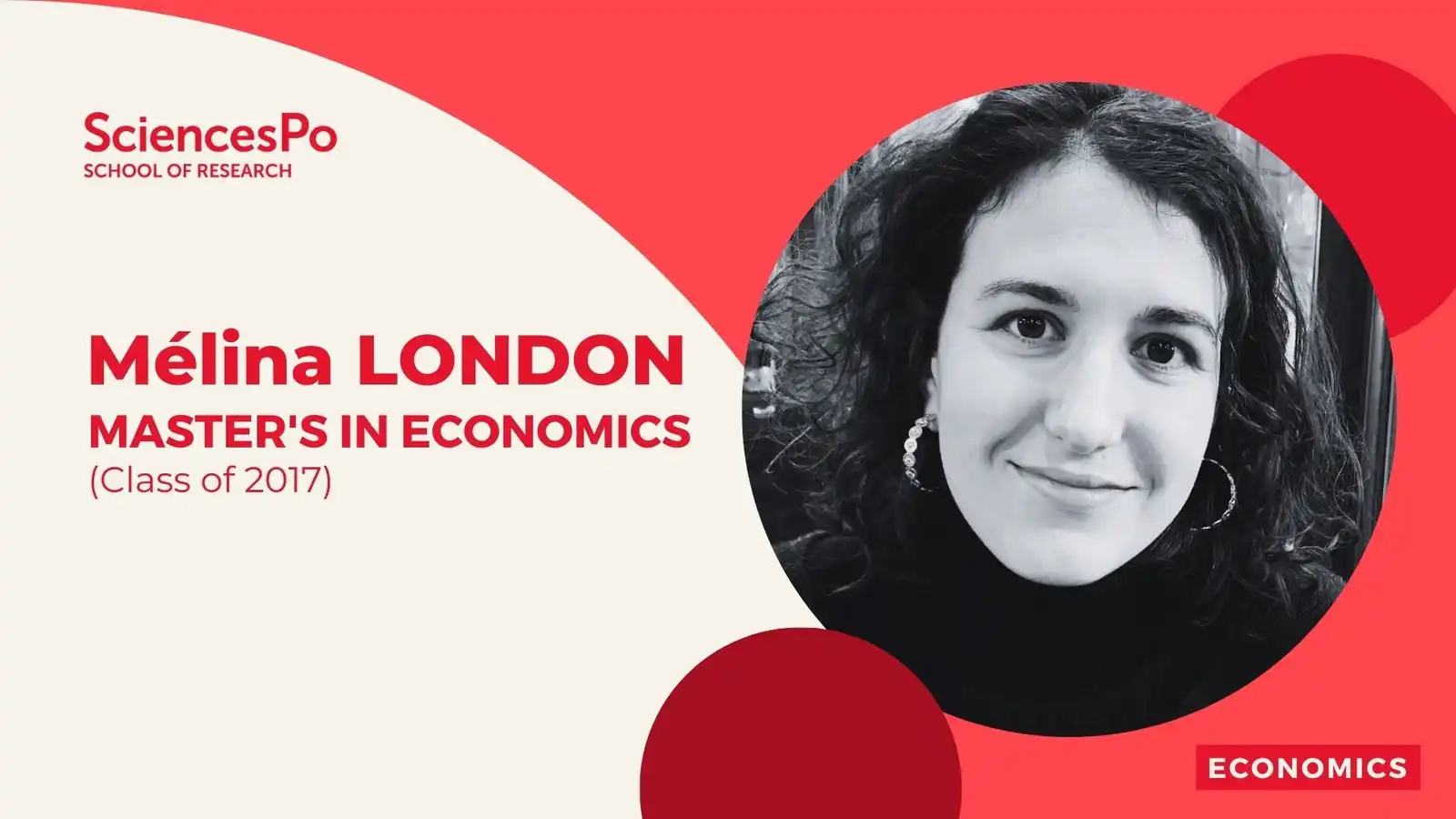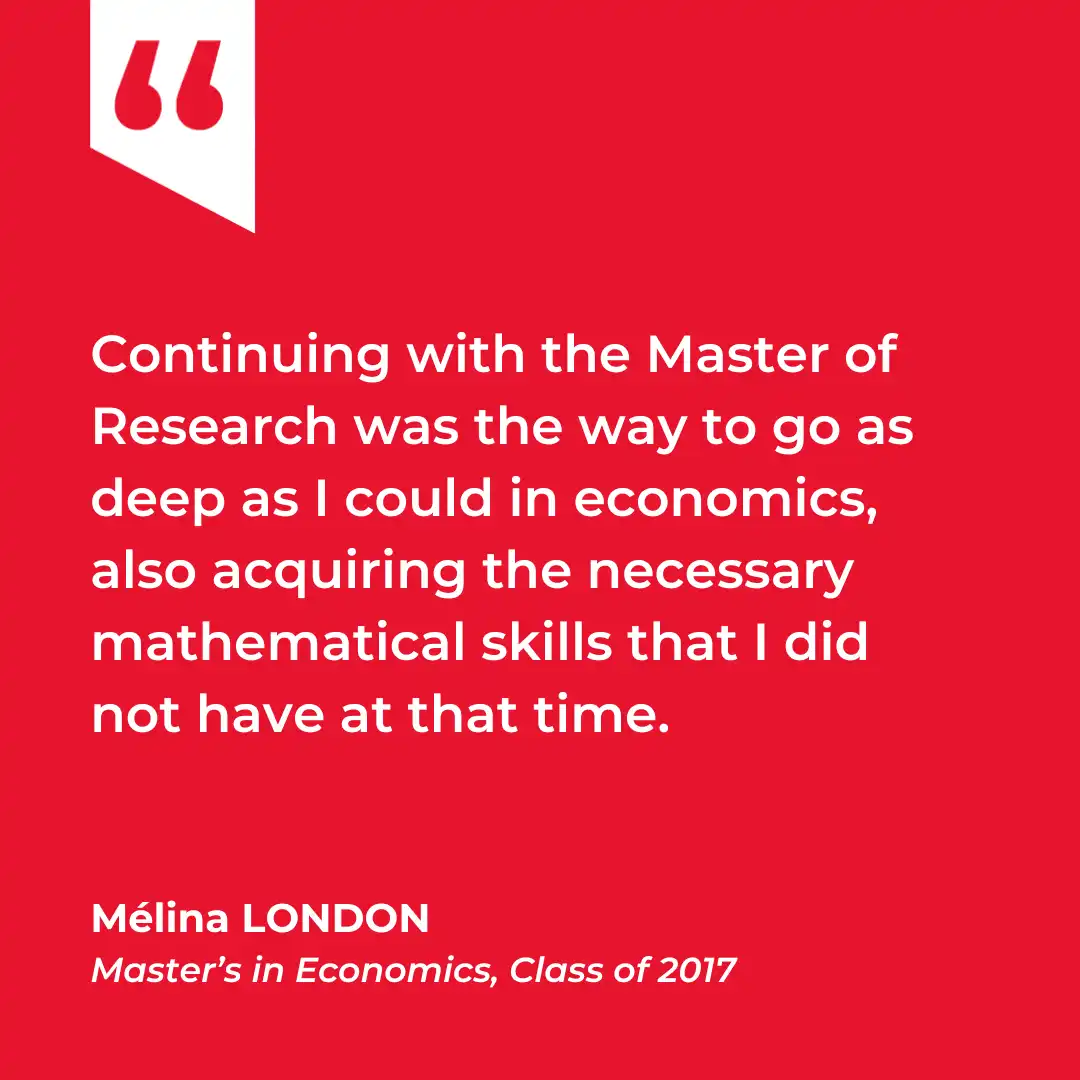Home>Mélina London, Class of 2017
12.03.2024
Mélina London, Class of 2017
COULD YOU TELL US ABOUT YOUR ACADEMIC BACKGROUND? HOW DID YOUR INTEREST IN ECONOMICS COME ABOUT?
I first did a bachelor in social sciences at Sciences Po. Then, I continued with the Master of Research in Economics at the School of Research. At the end of this master, I was not ready to continue with research, so I did a second master in apprenticeship at Paris Dauphine University. I was studying and working at the same time in the research department of Coface, a trade credit insurer. Then, finally deciding to go through with research, I followed up with an industrial PhD (called CIFRE in France) at Aix-Marseille University. This type of PhD is done in partnership with a private sector firm, Coface again in my case. I specialised on trade credit and network effects during my PhD.
Regarding my taste for economics, it all started with geopolitics. When I started my bachelor, I was very interested in geopolitics, and I quickly realised that economics and trade were key components in the geopolitical game. I think my interest grew following the mandatory class we had in macroeconomics at the end of the first year and I decided to continue with the economic specialisation in the second year. During my year abroad, done in the US, I had the chance to follow a class on financial macroeconomics and this made me decide to go fully on the macroeconomic side. Continuing with the Master of Research was the way to go as deep as I could in economics, also acquiring the necessary mathematical skills that I did not have at that time.
WHAT DID YOUR ACADEMIC JOURNEY WITHIN THE school of research BRING YOU? WHAT ARE THE MEMORIES FROM YOUR SCHOOL YEARS, YOUR FELLOW CLASSMATES AND TEACHERS THAT STAY WITH YOU TO THIS DAY?
The two years of master were quite challenging. We started studying a set of skills very different from what I had done during the bachelor, where we had very little math, while a large share of my fellow classmates came from mathematics or pure economics bachelors. Sometimes, it was hard to understand why we needed to study so many models while I wanted to understand the economic mechanisms at play in trade policy for instance!
However, thanks to this experience, I learned resilience, the continuous work to overcome difficulties, which were both extremely useful during the PhD. Most importantly, I also learned how to ask for help and work with others. We were a small class; it was easy to meet people and we built a small group within which we would always help each other. This solidarity is really my best memory, and today I still have close friends from this group.
What I also realised at that time is that economics is a complex field, with very different specialities, and it is very hard to manage all details. However, if you can count on people with a specialisation complementing yours, then, you can go much further! Today, in my research work it is something I continue to do, use others’ help to keep learning and growing. While I did projects by myself, I strongly prefer to co-author my research for this very reason.
WHICH TEACHER OR TEACHING HAS HAD THE GREATEST IMPACT ON YOU?
I really like the trade economics class I followed during the second year, which led me to do my master thesis on trade and migration. When I finally decided to go for a PhD, focusing on trade and international macroeconomics was an evidence. Studying trade also meant going back to my initial interest for geopolitics, as it is obviously closely linked to trade dynamics.
WHAT IS YOUR CURRENT POSITION OF EMPLOYMENT OR VENTURE?
Today, I am a Scientific Officer at the Joint Research Centre (JRC) of the European Commission, based in Ispra in Italy. The Joint Research Centre is the Directorate General in the Commission, which produces science to support policy making across all fields. I specialise in the green transition and climate change. While I work a lot on the financing of corporates’ green transition, I also continue to explore trade dynamics, networks and climate change in my research.
HOW DID YOUR ACADEMIC JOURNEY SHAPE YOUR CAREER PLAN?
My year of apprenticeship after the Master of Research helped me to take some distance with the theoretical knowledge I had learned at Sciences Po. I started seeing much more clearly why I needed the models to distinguish mechanisms at play in the news. Hence, I decided that I wanted to continue for the PhD in an industrial partnership to keep the applied side of my work while doing some empirical research. This was a great experience that I can only recommend. Being in a CIFRE context forces you to see how your research can be applied to other questions, how to communicate it to non-specialists. You also acquire professional skills you do not experience when you are at university. I would say it is more challenging, as you do not have the same research environment, at least in my case, as you can have at university. You have to create your own research network, navigate between two different worlds, and combine your research with more applied tasks for the firm. At the same time, you can take distance from your research, learn different perspectives from your non-researcher colleagues.
Having done this really shaped my career because it allowed me to enter quicker at the JRC where professional experience is required in addition to the PhD. It also considerably smooth my first months in the institution as I already had some experience navigating between research and more applied work needed for policy.
WHAT ADVICE DO YOU THINK EVERY PROSPECTIVE STUDENT WHO WISHES TO FOLLOW A CAREER SUCH AS YOURS ABSOLUTELY NEEDS?
To enter an international organisation to do in-depth analytical work or research it is helpful to have a PhD. However, it is not the only way. So, a PhD should be pursued because of an interest for research and a desire to study further the chosen field and gain more expertise. I can only recommend to students who aims at international organisations to look for some professional experience before doing the PhD, taking one year off to work, or doing some internship or apprenticeship as I did. In my experience, while the PhD is a great learning experience it can also be challenging, so you want to be sure of your reasons to continue in research. Doing this also give you professional codes that are very important if you decide to work outside of universities and academic context.

